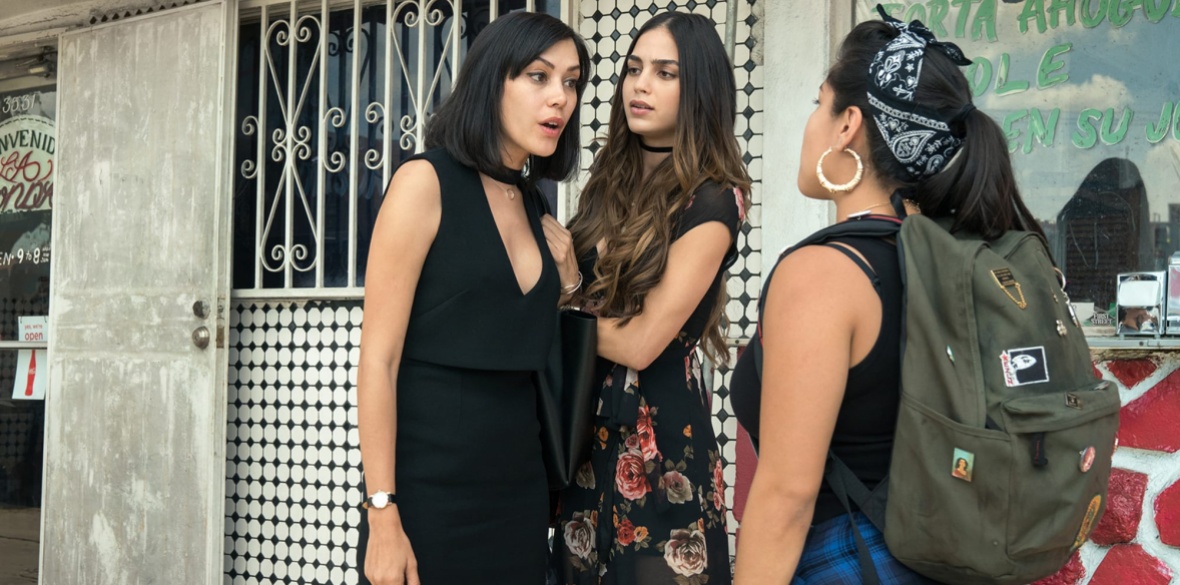This is the last article you can read this month
You can read more article this month
You can read more articles this month
Sorry your limit is up for this month
Reset on:
Please help support the Morning Star by subscribing here
REPORTS of a new kind of “white flight” to the suburbs, as in the 1960s, are currently all over the news in the US.
But this time it is also a flight from Covid-19 in beleaguered cities to the supposed safety of rural areas and the suburbs.
This flight is fuelling the decades-long process of gentrification and it’s the focus of a Mexican neighbourhood in the series Vida on Amazon Prime.
It opens with a bang. Young Mexican punk-goth woman Mari has a message to convey and she does it through through spray paint, posts a manifesto declaring her anger and willingness to fight back over the dispossession of her neighbourhood, the Boyle Heights section of Los Angeles.
The area has a long history as a progressive centre of the city, from the earliest times of its radical Jewish and Japanese populations.
Currently, it’s the centre of an attempted land grab, threatening its preponderantly Mexican population by the wealthy.
With the resettling of more affluent residents in Downtown LA, it could become a more fashionable alternative to Downtown with its increasing rents, akin to the hip and slightly cheaper Brooklyn’s relationship to Manhattan in New York.
Mari’s group, The Vigilantes, are activists disturbed and frightened as they watch the neighbourhood change around them.
Real estate developers from nearby Silver Lake, “eager for those Trump dollars,” are eyeing up the neighbourhood and in the vanguard is a Latino-fronted real estate group sucking the blood out of the area.
Mari and the activist group want to “Make America Brown Again” but Latino real estate agent Nelson Herrera is buying block after block of what the agency calls BoHe, the rebranding of Boyle Heights as a now fashionable location.
The shock troops of this land grab are white artists, whose outposts Mari spray-paints, while the real estate agency offers predatory loans that will result in residents losing their businesses.
Returning to this turbulent neighbourhood are the two Hernandez sisters, Emma and Lyn (Michel Prada and Melissa Barrera).
They have come back because of the death of their mother — the Vida of the title — and they’re now proud owners of their parent’s debt-ridden bar, a mainstay and impromptu gay centre of the area.
Emma is a tough-as-nails, corporate businesswoman from Chicago and Lyn, with hippie tendencies, is a kind of palimpsest of all California counter-cultures, a vegan slacker comfortable in the upscale hipness of nearby Silver Lake.
As the series opens, the sisters couldn’t be further from the Mexican roots of the neighbourhood. Searching for a “better” clientele, Emma wants immediately to get rid of the low-rent tenants in the bar building, many of them illegal.
Lyn, dropped by her Anglo boyfriend just after her mother’s death, seeks solace in the orgiastic complacency of Silver Lake poolside sex.
Both are brought down to earth and humanised by their reacquaintance with the neighbourhood.
Eddy, the gay wife of their mother, who also lays claim to the bar, finally shames Emma into not becoming an agent of dispossession herself by turning out the building’s tenants.
And Lyn, while being adopted by the affluent Silver Lake crowd, has second thoughts following the bus ride home with a Mexican maid who cleans up the bodily fluids of the privileged pool-goers.
Neighbourhood dispossession in the US has recently been a popular theme in film and television, including Gentrified, the Netflix series also set in Boyle Heights which, much slicker and hipper than this series, is also much less effective.
Mass dispossession of New York’s African-American and Hispanic populations is the subject of Robert Moses’s film Motherless Brooklyn, whose heart is in the right place but which is ultimately undone in by its clumsy Chinatown-clone narrative.
The nearest rival to Vida is The Last Black Man in San Francisco, a thoughtful and quietly sad film about the cleansing of that city of its poor and lower middle class by rocketing rents due to its proximity Silicon Valley.
But it’s a film that is perhaps too downbeat and as such lacks the immediacy and visceral impact of Vida.











